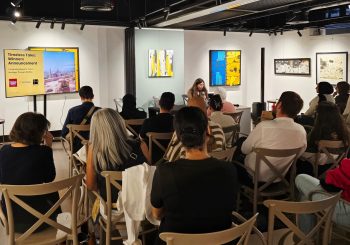Around fifty years ago, Gamal Abdel Nasser swept inside the house of each Arab man with a ringing bell to awaken Arab pride and unity. His initial success in nationalizing the Suez Canal opened up the eyes and hopes for the average Arab man to stand on the same level as the foreign superpowers.
It did not take long before the houses were quieted again and each Arab returned without a memory of the identity they were fighting for.
Today, in the context of globalization and the vast popularity of the English language, the Arab heart has become a center of contradictions. You hear from almost any Arab that they strongly support the liberation of Palestine – an issue that is considered to be central to the Arab identity – yet of the 3,500 young adults polled for the Arab Youth Survey 2015, more than a third state that they use English more than Arabic on a daily basis. The past hopes and beliefs are still very much alive but are increasingly becoming overshadowed by the present times.
For instance, it is with no doubt that if I were to ask you about the “present,” you would identify it as now, or as the current moment – you are both conscious and aware of its existence. You are certain of the fact that you are currently standing or sitting down as you read this article on a particular time of the day.
Yet, on a scarier level, this certainty of knowledge about yourself and the world around you seems to get less clear as you think of the past or the future. Did I really hate Math as a child? And will I still love writing in the future? Whatever answers you give to these questions make up the building blocks of your current identity.
On the contrary, an identity that is merely constructed by the present time eventually starts to die out, much like what is currently happening with most Arabs or other ethnicities diffusing into the “American culture.”
How is this so? To understand the statement above, one must come to understand Einstein’s theory of time that explicates how the three – the past, present and future – all coexist together. The separation of time, he discovered, does not exist – but how you measure time depends on your motion relative to a chosen frame of reference, such as the motion of the Earth’s orbit. Past time measurements like the sand hourglass can represent this by collecting time in one connected shape – the upper glass (past) and the lower glass (future) are resting on the same line.
Let us illustrate this further by connecting Einstein’s theory with the hourglass. For all we know, the cyclical orbit of the Earth determines the time that our mind grasps. That being so, we can suppose, then, that time takes the shape of a circle. We can also say that there are different lengths of time – the time to research on Google is “different” in motion from researching in a library. In that case, different lengths of times mean different sizes of circles. If time is a circle, and if there are different sizes of circles, then ultimately, we can picture a pattern of a big circle, then a smaller circle, then a smaller circle, and so on.
The circle of our modern days, however, becomes smaller as the years pass. What we perceive of the world and all our knowledge of it coils inside a cone shape of even smaller circles. At one point, these circles will reach the end point of the cone and our “modern knowledge” will cease to exist. Imagine it to be like the hourglass, with the modern time resting in the middle point. A rich, perceptive and insightful historical knowledge for our current time is the bang that will expand the circles again and transfer us to the lower part of the hourglass – the future. With history, we transcend beyond our present knowledge, beyond our circle of time itself and reproduce the bigger circles that carry our past origins and identity into the future.
William McNeill, a renowned Canadian-American historian, cleverly stated in his famous article “Why Study History?” in 1985 that “without individual memory, a person literally loses his or her identity and would not know how to act in encounters with others.”
For McNeill, history is the memory that a nation or an individual has; it is the act of knowing who we are and how we became that solidifies our identity into the future. If I had no memory of being a scientist, or that I cherished a passion for it as a child, how can I be motivated to think of inventions? Similarly, if I have little memory of what is an “Arab,” or that the Arab has ever made contributions to world history, the only “reasons” I would have for keeping my identity would be my country/passport and my language, which may quite easily weaken over time.
Some thousand years ago, the Arabs had greater skills in exploiting the past to rejuvenate their identity. Al Ma’mun, the seventh Abbasid Caliph, sent emissaries to the Byzantine Empire to collect ancient works of science and philosophy. Living in that same period was the notable scientist Ibn Haitham, who benefited from the Greek physician Galen’s study on optic pathways. By critiquing Greek theories of light and vision, he developed his own theories concerning human vision that have endured through time,
Reconnecting with the bigger circle of the Ancient Greeks, the Arabs knitted the past knowledge with their present and stamped their identity on each new discovery. The ink pens became intertwined with the Arab tongue and the books began to draw the Arab mind. From the past to the present, and from consumption to production, the new Arab was made.
Later on, the eminence and individuality of the Arab identity seemed to decline as the modern world began to increasingly focus on its own circle of time. In Nabil Matar’s book “Europe Through Arab Eyes,” the Arabs in the Ottoman Empire were striving to reach the new European identity within their own present circle.
Ahmad Ibn Ghanim, who brought the knowledge of Spanish warfare and military technology into North Africa, failed to use the history of the Islamic Golden Age to justify the use of new European inventions. Instead, he simply used the Islamic doctrine presently available.
There was also the act of denouncing European inventions by Ottoman ambassadors in 1721, naming France’s water technology a “man-made paradise” for “al kufar” (unbelievers). Such intolerance was not highly recognizable during the Abbasid period, as the head of the “House of Wisdom” – the major intellectual center – was frequently switched between a Christian and a Muslim.
Altogether, this culminates in weak identities being covered by wrong identities that clash with one another, as we see today with the secularists and the Islamists. Today, the hourglass carrying the Arab identity is broken in half – the Arab of the present is no longer connected with its past or its future.
To mend it back together, history should be taught in schools with more ingenuity and inclusiveness, along with careful consideration of its impact on the future. Indeed, it is the human’s ability to retouch history that creates us and distinguishes us from other creations. We become “individuals” rather than mere puppets consuming whatever is sent to them. This individuality is what the modern world lacks, and is what producing recurring conflicts between wrong identities.
Just as shapes like cones, spheres, and cubes carry volume, the shape of time illustrated above can be viewed three dimensionally with a straight line, or a height, down the hourglass. The three – the past, the present and the future – all come to rest on the same straight line, and by neglecting one we neglect all of them.







Comments (0)